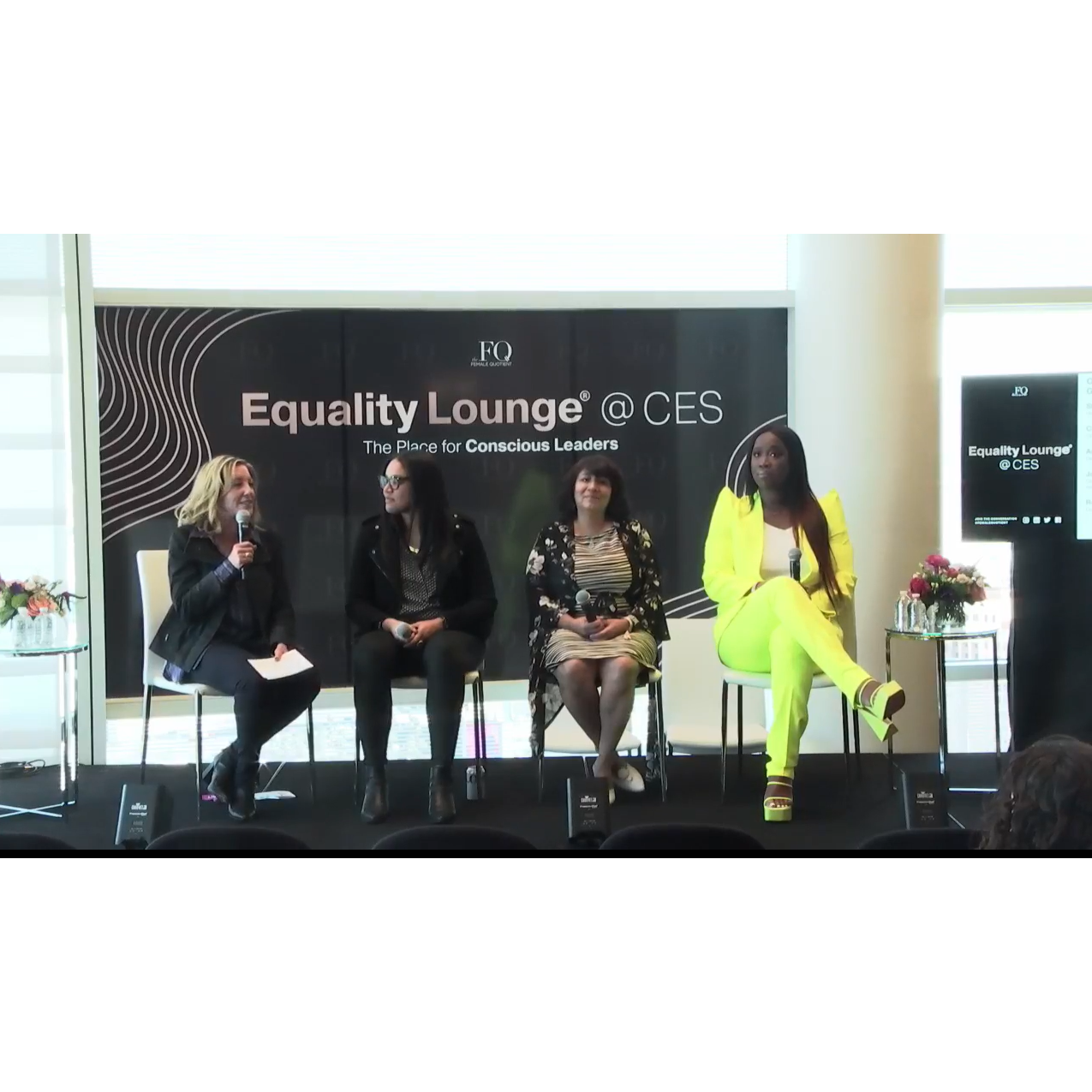FQ at CES: Building Better Team Communication With Tech, and Thoughtful Boundaries

While technology is like greased lightning, allowing teams to communicate instantly from around the globe, it has some downsides for organizations as well. The 24/7 nature of tech solutions for offices can infringe on personal boundaries and cause some unfortunate misperceptions. As a result, leaders are figuring out ways to troubleshoot those situations at the same time they're dreaming of even more exciting tech advances moving forward.
Those topics was all part of a panel discussion at CES last week that was organized by The Female Quotient (FQ). It focused on using technology for effective team communication.
Clearly there are pluses and minuses for each office solution on the market, and not everyone uses them in the same way. Microsoft Teams, Google Meet and Slack were all mentioned as favorite options. "With Slack, I like that I can deposit things there, and I can go back and find them. I find that super-efficient," said the panel's moderator, Ronda Carnegie, The FQ's Chief Innovation Officer. However, "I'm not Slack surfing all the time."
Carnegie asked the panelists how they think office technology will evolve. Annie Jean-Baptiste, Google's Director, Product Inclusion and Equity, said that during the pandemic she found it inspiring when people were "really scrappy" in coming up with solutions for business communication. "We found them really quickly; we were resilient. What's dangerous about that is sometimes the groups that are historically marginalized get left behind," she said.
"Of course, masks are super important, but if you think about someone who's deaf and lip reads, how are they supposed to do that with masks? How do we make sure that at key inflection points -- whether it's ideation or research and testing -- those that have been on the margins are a part of that process?" Jean-Baptiste added.
Future solutions connected to mental health and wellness are of key interest to Christena Pyle, Chief Equity Officer at dentsu Americas. "I love the boundaries that are starting to be put up, and the tracking and insights about my time that's served back to me," she said. "It'll flag me and tell me, 'You're working after hours,' or 'You worked after hours five times last week.'"
Creating boundaries involves communicating with other members of a team more clearly as well. At dentsu, "we call each other out. Some people have been very forthright," said Pyle. For example, one manager might caution another not to email staff members on the weekend, because their team dislikes it, even though no one will say so. "Our leadership team has gone through a lot of exercises to hold each other accountable."
Boundaries also become more complex when teams are based in various pockets of the globe. There's a massive time zone difference between staff members at Aristocrat, which designs, manufactures and markets gaming machines and software.
"When Australia logs in at 3 or 4 in the afternoon Pacific, they're all bright and cheery eyed," said Joan Saez, the company's Global Director of Business and Data Analytics, Digital Transformation. "We ran into a situation where they were demanding that everyone appear on camera. If you happened to cover London that day at 6:30 in the morning, by 4 in the afternoon, you're done." And you might not look or feel that great, either.
That's especially true if a parent has kids just getting home from school. For some women on the Aristocrat team, in particular, the demand seemed very aggressive. That's the kind of situation where leaders need to be an ally and run point, Saez added.
"It's really important for leaders to model healthy boundaries," said Google's Jean-Baptiste. "If you're always sending out messages at night and on the weekend, people are taking cues from that." Her team has a "non-negotiables" Google Doc. In it, someone might explain when they workout, or when they need to be with their kids. Or someone based in Paris might note that scheduling meetings throughout the East Coast workday really infringes on their personal life. "Everyone reviews that, and we update it on a quarterly basis."
Pyle says that dentsu has a team "charter" that's similar in nature. "We talk about communication styles, and our favorite mediums to communicate. I find that we do longform, here-are-the-details messages in email, and text is pretty urgent and pretty fast. In Microsoft Teams, it's about community."
When it comes to visioning and strategy, in-person meetings are optimal, Pyle and Saez noted. There was one instance when bringing Aristocrat's core team from Australia to the U.S. had striking results. Saez said that technologists can have some pretty abrupt conversations, which she's used to. But other staff members found that off-putting. "When we brought these people in, they got to see a warm and fuzzy side of these coders and solutions architects." It was surprising for some, in a very positive way.
Click the social buttons to share this story with colleagues and friends.
The opinions expressed here are the author's views and do not necessarily represent the views of MediaVillage.com/MyersBizNet.


